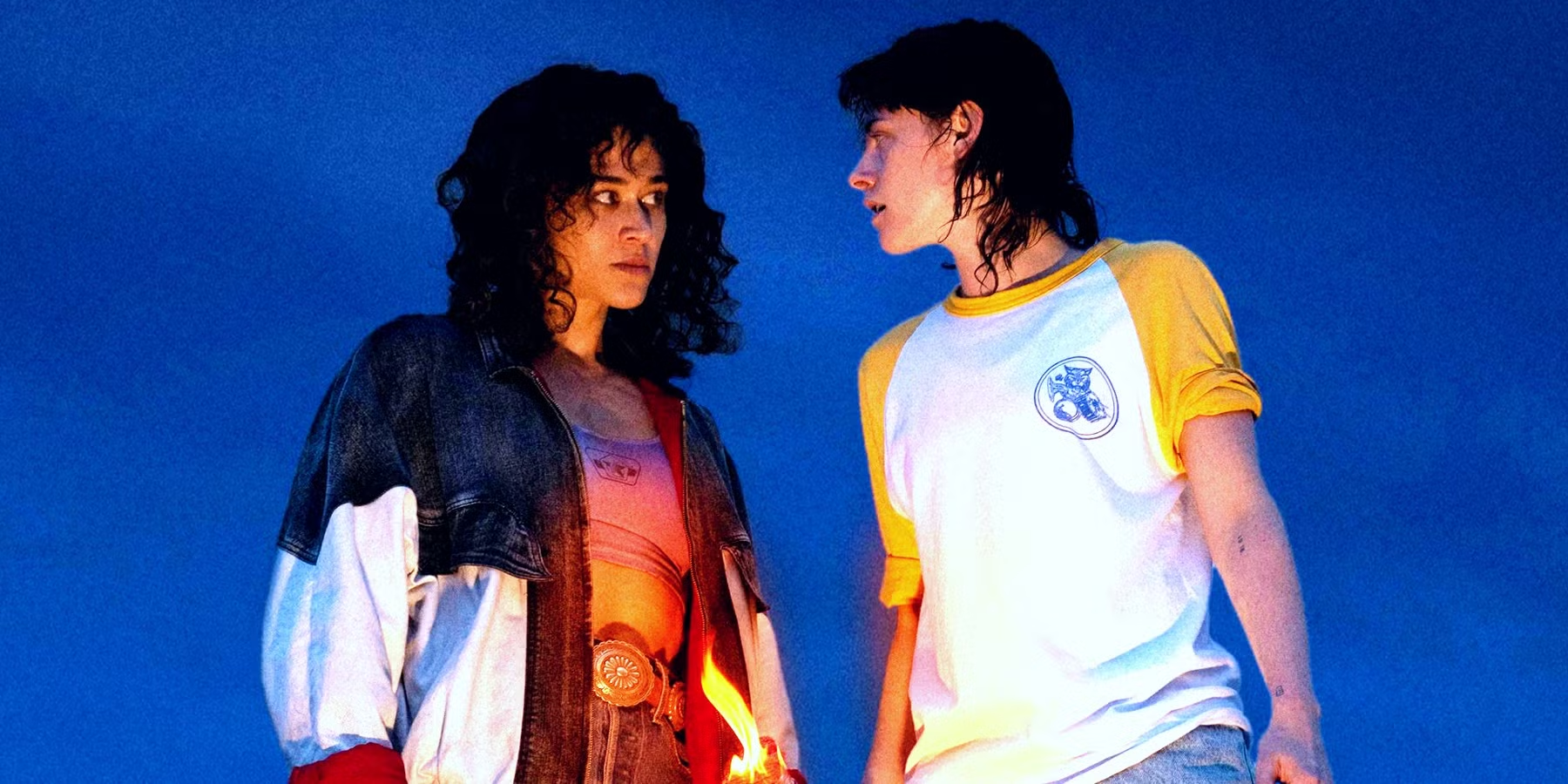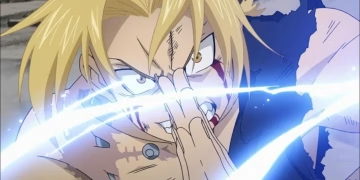Love Lies Bleeding, A24’s surreal crime thriller, merges gritty 1980s Southwestern U.S. realism with dreamlike visuals. Directed by Rose Glass, known for Saint Maud, the film explores obsession, love, violence, and family drama through the intense journey of Lou (Kristen Stewart) and Jackie (Katy O’Brian). What starts as a love story quickly spirals into chaos, with bodies piling up, moral ambiguity, and a blurry line between fantasy and reality. The film’s conclusion leaves the audience to interpret the events in various ways, with surreal imagery and metaphors throughout.
Love Lies Bleeding Ending Explained

In the climax of Love Lies Bleeding, Lou confronts her father in his mansion after narrowly escaping an assassin he sent. She frees Jackie, who is planning to flee from the FBI, while Lou seeks revenge on her father. Lou is shot by her father, who denies killing Lou’s mother, claiming she left them. As Lou’s life hangs in the balance, Jackie undergoes a dramatic transformation: her muscles grow, and she becomes a 50-foot giant, overpowering Lou’s father and rescuing Lou. Both women, now giant and dressed in sequined outfits, escape together, running through clouds and heading toward the sunrise.
As Lou and Jackie drive through the night, Lou realizes that Daisy, whom she thought dead, is alive. Lou then strangles Daisy in a dark moment of humor before dragging her body into the desert. This scene, like much of the film, blurs the line between love, violence, and absurdity, creating a haunting atmosphere.
Symbolism in Jackie’s Transformation
Jackie’s physical transformation throughout the film represents her inner strength and personal growth. At various points, her muscles bulge to exaggerated proportions, symbolizing her struggle for strength and confidence. By the film’s climax, when she becomes a giant, this physical change symbolizes her release from insecurity and the external substances, like steroids, that once fueled her. Early on, Jackie relied on steroids for physical enhancement to protect herself, particularly from Lou’s father. However, as her relationship with Lou deepens, she grows emotionally and mentally, transcending the need for steroids. The transformation into a giant is symbolic of her self-confidence, showcasing her strength in a pure, untainted form.
Daisy (Anna Baryshnikov) plays a key role in the film as someone obsessed with Lou. Daisy’s obsession leads to tragic consequences, culminating in her being shot in the face. However, Daisy survives, though her fate remains unclear—was her survival a miracle, or a sign of Lou’s compassion? The ambiguity surrounding Daisy’s fate complicates Lou’s character and the broader theme of obsession in the film. Did Lou kill Daisy out of mercy, or was it a cold act of violence? This moral ambiguity invites multiple interpretations and adds to the film’s complex character study.

Lou’s Complicated Relationship with Her Father
Lou’s relationship with her father, a ruthless gun-runner, is central to the narrative. While Lou tries to distance herself from his criminal world, she ultimately finds herself repeating many of his violent actions. She is willing to kill and deceive in order to protect those she loves, much like her father. This dark legacy hangs over Lou’s every decision, and as she seeks revenge on him, the audience is left questioning if she’s truly breaking free from his influence or merely following in his violent footsteps.
Lou’s mother’s fate is another central mystery in Love Lies Bleeding. Lou accuses her father of killing her mother, who allegedly planned to turn him into the FBI. However, Lou’s father denies this, claiming she left them years ago. The unresolved mystery of Lou’s mother’s death adds another layer of deception to the story. It’s unclear whether Lou’s father is lying, or if the truth lies somewhere in between. This unresolved plot point deepens the film’s exploration of moral ambiguity and betrayal.
The Role of Steroids in the Story
Steroids are a key metaphor in the film, symbolizing addiction and obsession. While Lou struggles with nicotine addiction, Jackie’s steroid use stands as a more prominent example. Initially, Jackie uses steroids to enhance her physical abilities and protect herself, but this reliance leads to violence and hallucinations. Her addiction escalates throughout the film, peaking during a bodybuilding contest in Las Vegas where her aggression grows uncontrollably.
By the film’s end, Jackie transcends her steroid dependency, as her transformation into a giant marks her shift away from external enhancements and symbolizes her growth into her true, powerful self. This final moment illustrates the importance of self-confidence over destructive reliance on substances, reinforcing the film’s theme of overcoming obsession and embracing self-realization.
Director Rose Glass’ Vision for the Ending
Rose Glass intentionally made the film’s ending surreal to emphasize the characters’ emotional growth and the intensity of love. In interviews, Glass explained that the fantastical moments, such as Jackie’s transformation into a giant, reflect the characters’ sense of invincibility and elation when deeply in love. The film’s surreal ending serves as a culmination of their journeys, highlighting the power of love, self-empowerment, and overcoming insecurities. The contrast between grounded and fantastical elements strengthens the emotional impact, making the film’s conclusion both haunting and powerful.

Reception of the Ending
Love Lies Bleeding received critical acclaim, with many praising its bold storytelling and Glass’ vision. However, the film’s ambiguous ending sparked mixed reactions. Some viewers found the surreal conclusion perfect, while others felt a more straightforward resolution would have been more satisfying. Despite varying opinions on the ending, critics appreciated the film’s exploration of dark themes like obsession, love, and self-destruction.
Director Rose Glass’ Filmmaking Challenges
Creating the film’s surreal final moments presented significant challenges for Rose Glass, particularly with the visual effects needed to bring Jackie’s giant transformation to life. Glass, known for her more intimate work in Saint Maud, had to learn new filmmaking techniques, including working with CGI elements. Despite the difficulties, Glass succeeded in blending fantasy and reality, creating a visually striking and emotionally resonant conclusion.
Love Lies Bleeding combines surrealism and grounded crime thriller elements to explore obsession, self-destruction, and the complexities of love. The film’s ambiguous ending, with its blend of dark humor and powerful symbolism, leaves much for the audience to interpret. From Jackie’s physical transformation to Lou’s complicated family dynamics, the film offers a layered, thought-provoking experience. Ultimately, the ending’s surreal quality serves to underscore the characters’ emotional and personal growth, making it an unforgettable cinematic journey.





